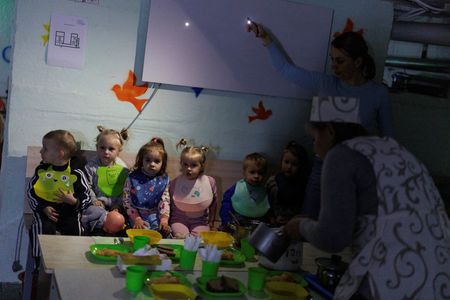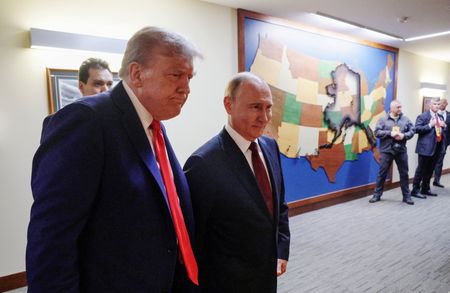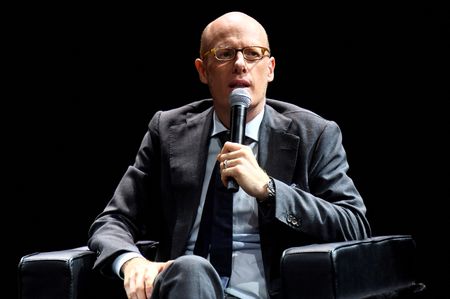By Pavel Polityuk
CHERNIHIV, Ukraine (Reuters) -Ukrainian cook Natalia Meshok leaves home at 2 a.m. for the nursery where she works, using night-time hours when power supply is more or less stable to prepare food for dozens of children.
Meshok, 59, lives and works in the northern city of Chernihiv, which has been hammered by repeated Russian drone and missile attacks on its power infrastructure in recent weeks, causing regular blackouts and disrupting daily life.
“Completely empty and dark. It’s a bit scary, but you realise you have to go because there are children here,” she said, standing in a dark kitchen where pots of food rested on the stove ready to be served when the kindergarten opened.
Chernihiv was one of the first cities to feel the brunt of intensifying Russian strikes on electricity and gas facilities across Ukraine, including in the capital Kyiv where hundreds of thousands of households lost power after an Oct. 10 attack.
RUSSIA TAKES AIM AT POWER SECTOR, HEATING
Officials say the frequency and accuracy of such attacks have increased during the last two months, leading some to predict a particularly hard 2025/26 winter as the war approaches its fourth anniversary.
“We are preparing for various scenarios, including the worst-case ones,” energy minister Svitlana Hrynchuk said just before the Oct. 10 attack.
President Volodymyr Zelenskiy said Russia launched 3,100 drones and 92 missiles at Ukraine in just one week starting on Oct. 6.
Russia denies targeting civilians, saying that its objective is to degrade Ukraine’s military capabilities.
Meshok was glad the electricity lasted longer than the usual couple of hours that night, meaning that she and her fellow cooks managed to prepare lunch for the children – aged from 2 years and up – as well as breakfast.
“Do you know why children are in the nursery? Because their parents are working. No one has cancelled that. They need to go to work,” said Yevheniia Savchenko, director of the nursery, a municipal facility.
It had been raining in Chernihiv for almost a week when Reuters visited in early October, and the temperature in the nursery was 14 degrees Celsius (57 F). The basement, which doubles as an air raid shelter, was slightly warmer.
Savchenko said she did not know when the heating would be turned on.
In peacetime, Ukraine provided heating to state facilities in time for the so-called “heating season” that starts in mid-October when temperatures typically begin to drop.
MANY CHILDREN KEPT AT HOME FOR WARMTH
Frequent air raid sirens mean the children at Chernihiv’s kindergarten No. 72 spend much of their days in the basement, playing, singing and eating.
At one point the brightly lit space was plunged into darkness, prompting excited shouts from some of the toddlers, before a generator kicked in and the lights came back on to cheers. The generator can provide light, but not heating.
Savchenko said only about 65 children were attending the kindergarten out of a total of 170 registered there.
“As long as there is no lighting and no heat, they (some parents) try to keep the child at home, because there they can heat the room a little with gas,” she said.
HITS TO POWER GENERATION, ELECTRICITY TRANSMISSION, GAS
Russia has been targeting Ukraine’s energy system throughout the war, and this autumn it has hit both power generation and electricity transmission systems, as well as gas production facilities.
Earlier this month, Russian forces struck Ukraine’s main gas fields, and the energy minister, Hrynchuk, said “significant” damage could force Kyiv to increase its gas imports by a third.
Ukraine, which says it does not attack civilian infrastructure, has in turn stepped up attacks on Russian oil refineries, causing a drop in oil processing and creating fuel shortages in many regions.
During the heating season, Ukraine uses gas mainly for the centralised urban heating system that is left over from Soviet times, without which millions would be living in cold homes as temperatures outside frequently drop below freezing.
If that system is unable to function fully, the electricity supply will not be able to compensate.
Some politicians are urging city dwellers to find winter accommodation in villages where they can use direct natural gas supplies to households or wood for heating.
There have been such warnings in previous years. But this year the energy minister announced for the first time since the war began in February 2022 that the government is prepared to restrict gas supplies to the population if needed, not just electricity.
“They want to break us, but just as Ukraine is not broken, neither are Ukrainians,” Meshok said of the Russians.
“We will endure … and we will prevail, without fail. Faith in the future is essential. Because if there is no faith in the future, then what is the point of our endeavours?”
(Reporting by Pavel PolityukEditing by Mike Collett-White and Frances Kerry)















